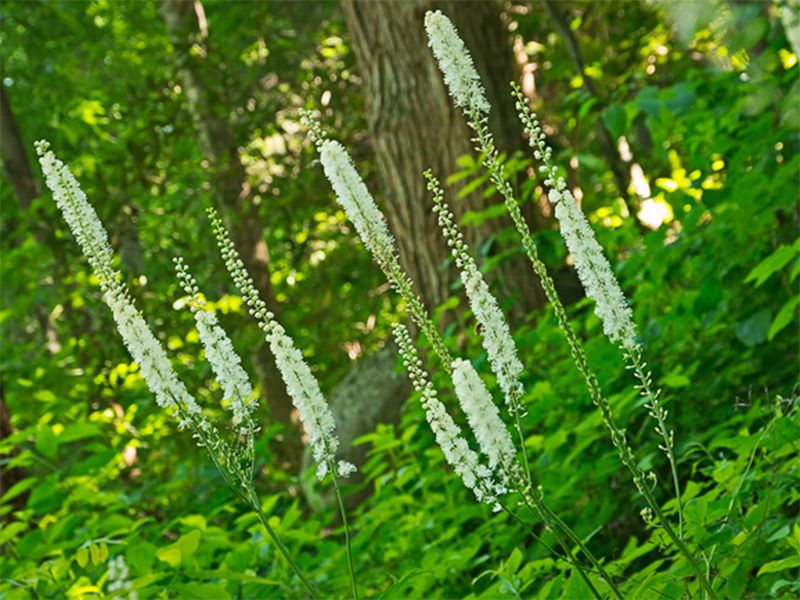Black Cohosh
Native Americans have known of the healthful benefits of the black cohosh plant for centuries. When European settlers came to the New World and learned of its medicinal properties, they gave it the name black snakeroot for the unfounded idea that it cured venomous snake bites. Other names it has acquired through the years include bugbane and bugwort for its supposed ability to repel insects2. From the early 19th century, black cohosh has been used to treat a variety of women’s health issues, including premenstrual discomfort, acne and the symptoms of menopause.
English Name: Black cohosh
Latin Name: Actea Racemosa
Type: Herbal
What is Black Cohosh?
Black cohosh is a member of the Ranunculaceae family of flowering plants that also includes delphiniums, goldenseal, monkshood and clematis. It is commonly found in woodland areas of the eastern half of North America but is also a popular garden perennial for its long blooming period and hardiness in drought conditions.
The plant is recognizable for its distinctive, tall, white flowers and their sweet, slightly rank odor that attracts many species of flying insects. The root and rhizome – or underground stems – of the plant are most coveted for medicinal uses. These are dried and often ground for use in extracts, capsules and tablets1. Oddly, it is not at all related to blue or white cohosh, which belong to a completely different family and do not share black cohosh’s health benefits.
How does it work?
Scientists are still trying to pinpoint the exact ways black cohosh impacts the human body. The plant has been used to treat women’s health issues for centuries – with positive anecdotal results that don’t quite qualify as scientific proof of its efficacy. However, studies since the 1950s have shown great promise in the potential for black cohosh to have therapeutic effects on the symptoms of menopause3.
The most common school of thought on how black cohosh works involves the hormone estrogen and the neurotransmitter chemical serotonin. It is unclear exactly how the herbal supplement affects estrogen, though it seems to raise and lower levels of the hormone at different times and in response to different stimuli. Its relationship to serotonin is similarly unclear right now, but there is evidence that black cohosh reduces many types of inflammation – which researchers are learning has an effect on many systems and processes throughout the body4.
What are its benefits?
The chief benefits reported in connection with taking black cohosh supplements are relief from the symptoms of menopause — mood swings, night sweats, decreased mental performance — and relief from conditions that are less directly related to estrogen, like migraines, osteoporosis, heart disease and pain from osteoarthritis and Rheumatoid arthritis2.
There are few known adverse side effects other than the risk of allergic reaction and a very rare risk of liver damage, but studies so far suggest the healthful effects may only be temporary, and long-term use may not increase the benefits3.
Products featuring Black Cohosh
MellowPause™ Daily for Hormonal Balance Support
Fertile XX™ for Female Fertility Support

Practice Self Care
Native Remedies recommends you consult your doctor before introducing new remedies into your regimen. Always ensure you are buying high-quality, laboratory-tested supplements from a reputable supplier. At Native Remedies, we back all our products with a 100 percent money-back guarantee. If you’re not happy with your purchase after trying it for 30 days, simply send it back for a refund. Here’s to your good health!
The content provided is for informational purposes only. It is not a substitute for professional medical advice. If you have a health condition, please consult a medical professional and do not use this information to self-diagnose or self-treat.
References:- "Black Cohosh." National Center for Complementary and Integrative Health. November 29, 2016. Accessed August 13, 2018. https://nccih.nih.gov/health/blackcohosh/ataglance.htm.
- "Black Cohosh: Uses, Side Effects, Interactions, Dosage, and Warning." WebMD. Accessed August 13, 2018. https://www.webmd.com/vitamins/ai/ingredientmono-857/black-cohosh.
- Huizen, Jennifer. "Black Cohosh for Menopause: Uses and Side Effects." Medical News Today. May 20, 2017. Accessed August 13, 2018. https://www.medicalnewstoday.com/articles/317530.php.
- "Office of Dietary Supplements - Black Cohosh." NIH Office of Dietary Supplements. March 3, 2017. Accessed August 13, 2018. https://ods.od.nih.gov/factsheets/BlackCohosh-HealthProfessional/.
Reviewed by Master Herbalist, Mary Ellen Kosanke